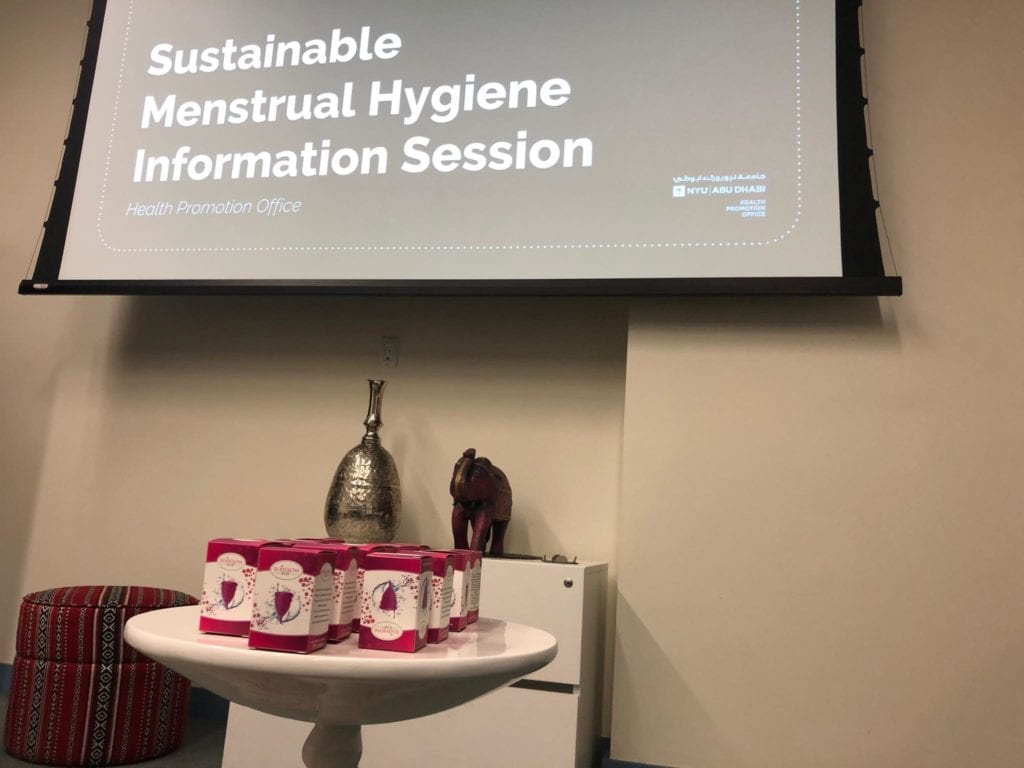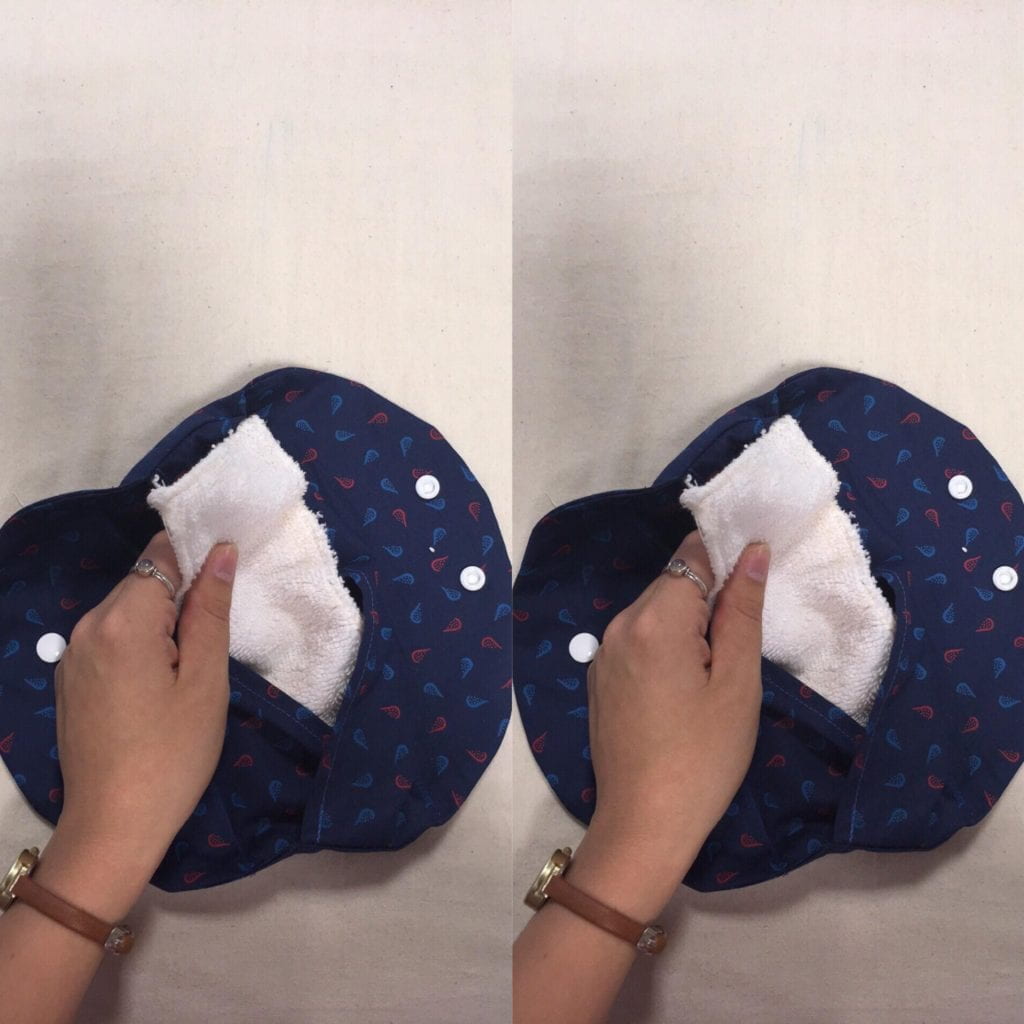 Lubnah Ansari is a third-year undergraduate student at New York University Abu Dhabi. She is pursuing her B.A. in Social Research and Public Policy, along with a minor in The Environment. In 2017, she initiated the first Sustainable Menstruation Workshop on campus under the Ecoherence student interest group. In 2018, Lubnah was awarded the Innovative Leadership Award by the Campus Life Leadership Awards for her efforts towards the project. Here is an update from Lubnah about the Sustainable Menstruation Initiative at NYUAD.
Lubnah Ansari is a third-year undergraduate student at New York University Abu Dhabi. She is pursuing her B.A. in Social Research and Public Policy, along with a minor in The Environment. In 2017, she initiated the first Sustainable Menstruation Workshop on campus under the Ecoherence student interest group. In 2018, Lubnah was awarded the Innovative Leadership Award by the Campus Life Leadership Awards for her efforts towards the project. Here is an update from Lubnah about the Sustainable Menstruation Initiative at NYUAD.
The average woman will use 12,000 to 16,000 disposable sanitary pads in her lifetime. MHPs are non-biodegradable, taking approximately 500 to 800 years to decompose. All of this waste adds up. 56 percent of the waste produced in Bengaluru, India, for example, is sanitary waste. Around the world, waste generation rates are rising, and the addition of sanitary napkins and tampons exacerbates this waste issue. The Sustainable Menstruation initiative (SMI) was launched in 2017 at NYUAD to recognise the high volume of non-biodegradable waste and physical health impacts that derive from disposable menstrual hygiene products (MHPs).
A crucial part of the initiative is carrying out the Sustainable Menstruation workshops. The sustainable menstruation workshops are gender-inclusive and open to the entire NYUAD student body. The workshops focus on educating the student body on the physical health and environmental impacts of disposable MHPs. In addition, it spreads awareness on the alternative, sustainable menstrual products that are available. Towards the end of the session, we distribute free menstrual cups to the participants.
 During the Spring semester, we held two Sustainable Menstruation Information workshops. As the coordinator of the project, I was unable to work on the initiative at a grass-roots level because I was studying abroad at NYU Berlin. However, I had two marvelous peers lead the workshops with great enthusiasm, Diana Siu and Liene Magdalēna. Spring semesters at NYUAD are relatively quiet with half the students studying abroad at NYU’s global network. Nonetheless, Diana and Liene managed to gather students’ attention and guide the workshops successfully.
During the Spring semester, we held two Sustainable Menstruation Information workshops. As the coordinator of the project, I was unable to work on the initiative at a grass-roots level because I was studying abroad at NYU Berlin. However, I had two marvelous peers lead the workshops with great enthusiasm, Diana Siu and Liene Magdalēna. Spring semesters at NYUAD are relatively quiet with half the students studying abroad at NYU’s global network. Nonetheless, Diana and Liene managed to gather students’ attention and guide the workshops successfully.
The Reusable Pads workshop is a follow-up session to the Sustainable Menstruation workshop. Not only are reusable pads a great support to menstrual cups, but they are also a less intimidating and culturally-friendly option for those who have reservations about the vaginal insertion of menstrual products. In such workshops, we teach students how to make their own, hygienic reusable pads and the steps one must take to ensure proper cleaning of the product. The hands-on, interactive nature of this workshop made it one of the most exciting projects under the SMI. This semester, we held one Reusable Pads workshop.
During the summer, we planned to partner with other institutions in order to educate and spread awareness about Sustainable Menstruation in the UAE. However, due to the timings of religious holidays and the nature of summer terms for academic institutions, we have been quite unsuccessful. Nonetheless, we are trying to network with students from other universities and create a plan for Fall 2019.
From sustainable menstruation workshops to creating hygienic, reusable pads, we are creating a deep awareness in the student body about the environmental and health impacts of unsustainable, commercial MHPs. We strive to make individuals conscious consumers who are aware of the backstage costs to what they consume. We can’t wait for what next semester holds. It is an honor and a privilege to work towards creating a healthier, sustainable campus.
NYU Green Grants are awarded to improve the university’s operational environmental performance, foster environmental literacy and community engagement, advance applied research and design, and demonstrate the viability of best practices and technologies for sustainability. The Green Grants Selection Committee awards up to $20,000 for the most feasible, impactful, and innovative projects that have potential for institutionalization on campus or are self-sustaining.
